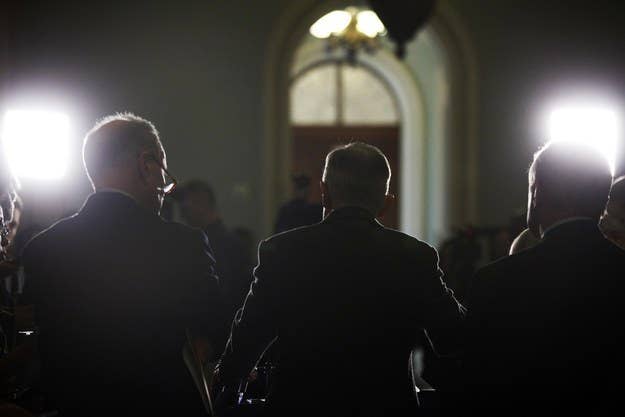
WASHINGTON— As the White House prepares to send language to Capitol Hill authorizing the use of force against ISIS, senators from both parties are saying significant changes need to be made in order for it to pass.
Hawkish Republicans say they'll refuse to vote for an Authorization for Use of Military Force that limits the president in anyway. Democrats and dovish Republicans won't vote for an AUMF without some limitations on ground troops and a strict timeline for an AUMF expiration.
How exactly something would pass Congress in the next couple months is now open question as the United States continues to strike ISIS in Iraq and Syria.
"I don't know the answer to that. We have not really taken a task like this on in a long, long time," said Minority Whip Dick Durbin, when asked how a bipartisan compromise would come about. "The last time we got close to it was the decision to invade Iraq. There was a lot of back and forth… I assume it starts in in the foreign relations committee but beyond that I assume it's going to be the subject for floor debate."
Durbin said the debate would "not be easy" but a lengthy debate may be necessary "to get it right."
White House Chief of Staff Denis McDonough and legal counsel Neil Eggleston briefed senate Democrats on the emerging plan Tuesday afternoon during the caucus lunch. Final language from the White House is not expected until Wednesday or Thursday at the latest. Democratic Leader Harry Reid described the lunch as a "beginning of a discussion."
Democratic members are deeply concerned over four words, Durbin said. The White House AUMF would limit "enduring offensive ground operations" but defensive operations would be exempt.
"We're talking about the department of defense so there is hardly any military operation that cannot be characterized as defensive. Defensive operations are exempt, it would limit offensive operations," he said. "That's where we have to dig in."
Sen. Chris Murphy, an outspoken voice in the party for the need for a more restrictive AUMF said that he would need the ground troop language to change before he could support it.
"It seems to be a substantial change from the draft on the limitations on ground troops that came out of the foreign relations committee," he said.
Democratic senators did said they were happy to hear about certain elements the president planned to include -- a sunset of the 2002 Iraq AUMF and a 3-year authorization, meaning the next president would have to quickly re-evaluate a new AUMF upon taking office.
Foreign Relations Chairman Bob Corker, told reporters there would be many hearings and no "rush" to get something passed.
Sen. Lindsey Graham, a Republican from South Carolina, told reporters he was briefed earlier Tuesday by the White House and specifically asked about the use of force against Syrian president Bashar al-Assad
"I asked a question, would the authorization of the use of military force allow us to engage Assad's forces if we sent a ground component into Syria and he tried to attack the people we trained and they said no," Graham said. "In my view unless you are allowed to do that we will fail. You will not defeat ISIL because the army you train to defeat ISIL will be made up of Syrians and they are going to turn on Assad. If you don't protect that army from an Assad air campaign they will fail. If you aren't willing to do that, don't send them in."
"I'm not going to vote for an AUMF that doesn't allow us to destroy ISIL," he added.
Likewise, Sen. John McCain said he would not vote for anything that constrained the president.
"If we don't like what the president does we have the power of the purse but the president is the commander in chief and we should not constrain his military actions," he said. "I want to give him the authority to do what he needs to do in the region."
